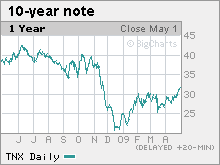Treasurys mixed on economic data
Demand for ultra-safe U.S. debt wanes as economic indicators suggest stabilization. Government to auction $71 billion this week.
NEW YORK (CNNMoney.com) -- Treasurys were mixed Monday as signs the economy may be stabilizing outweighed concerns about the record amounts of debt coming to the market this week.
Bond prices have fallen in recent sessions as better-than-expected readings on housing, manufacturing and consumer spending raised hopes the economy is stabilizing.
The improved data has undermined demand for safe-haven assets such as Treasurys and boosted the market's appetite for higher-yielding assets such as stocks.
Bond gains were limited by the stronger stock market Monday. The Dow Jones industrial average (INDU) gained 166 points, or 2%, with 20 minutes left in the session.
Economic reports out Monday helped support the optimistic tone.
Pending home sales rose for the second month in a row, jumping 3.2% in March, compared with expectations for no change.
Another report showed construction spending rose in March versus a forecast for a sharp decline.
Steve Van Order, chief fixed income strategist at Calvert Funds, said the government's purchases of mortgage-backed securities and short-term commercial paper, among other plans aimed at easing credit conditions, are helping.
"We're not back to healthy, but deterioration in market conditions is slowing," he said.
Meanwhile, the bond market remains concerned about the massive sum of debt available.
The Treasury Department will auction $71 billion in 3-, 10- and 30-year debt this week, beginning with an auction of $30 billion worth of 3-year notes Tuesday. That comes after $101 billion was sold last week.
The auctions will take place as the government seeks to fund a record deficit, economic stimulus and financial rescue plans. As the government floods the market with new issues, many analysts worry that supply will weigh on prices.
The Federal Reserve bought another $8.5 billion worth of U.S. debt Monday as part of its plan to drive down interest rates by purchasing $300 billion in Treasurys.
It was the largest purchase since the Fed started buying Treasurys in March and fueled speculation that the program could be expanded.
"The larger size of the Fed purchase may have helped the market's tone," Van Order said.
Bond prices: The benchmark 10-year note was up less than 1/32 at 96 21/32, and its yield held at 3.16%. Bond prices and yields move in opposite directions.
The 30-year bond jumped 6/32 to 90 12/32, and its yield slipped to 4.06% from 4.07%.
The 2-year note was down 3/32 at 99-28/32, and its yield rose to 0.94%.
The yield on the 3-month held rose to 0.18% from 0.14%.
The London Interbank Offered Rate, a daily average of rates that 16 different banks charge each other to lend money in London, was not published Monday because of the May Day holiday. ![]()


